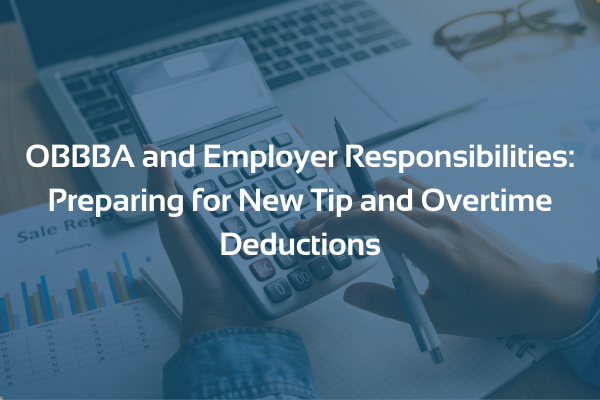
The One Big Beautiful Bill Act (OBBBA) introduces significant new deductions for workers beginning in tax year 2025:
- A deduction of up to $25,000 for qualified tips in certain occupations
- A deduction of up to $12,500 ($25,000 for joint filers) for the overtime premium portion of pay
While these benefits are welcome for employees, the way they are being rolled out creates substantial compliance challenges for employers. The IRS has confirmed that for 2025, Forms W-2 and 1099 will remain unchanged, and federal withholding tables will not reflect the new deductions. This means that much of the responsibility for ensuring accuracy will rest on employers and their payroll systems.
Why Employers Should Pay Attention Now
The law applies retroactively to January 1, 2025, so any tipped wages or overtime premiums paid this year may be deductible by employees when they file in 2026. However, without separate reporting fields on W-2s or 1099s, employees will need detailed year-end information from you to substantiate their claims.
If your business employs tipped workers, or hourly workers who earn overtime, your payroll system will need to track these amounts separately for the remainder of 2025 and beyond. The challenge is that the IRS has allowed “reasonable estimates” to be used for 2025, but has not yet defined exactly what counts as reasonable. That uncertainty leaves employers in a position where accuracy is important, but the rules are still developing.
What This Means for Your Workforce
Employees will not see any change in their take-home pay this year. Federal income tax will still be withheld on their full wages—including tips and overtime premiums—and the benefit will only be realized when they file their tax returns in 2026.
Since the IRS is not changing wage reporting forms in 2025, employees will have to rely on either employer-provided year-end statements or their own records to determine their deductible amounts. Without accurate employer records, workers may have difficulty claiming the full deduction they’re entitled to.
This means that proactive communication from you as the employer will be critical. If you don’t have a plan for year-end reporting of qualifying tips and overtime, your employees could be left frustrated—or even skeptical—if they believe they’re missing out on deductions.
Steps Employers Should Consider
- Evaluate payroll capabilities: Confirm whether your payroll provider can track tips and overtime premiums separately from regular wages for 2025, even if reporting to the IRS remains aggregated.
- Document your methodology: If you will be relying on estimates for 2025, clearly record how those estimates are calculated so they can be defended if questioned.
- Plan for year-end reporting: Determine now how you will provide employees with a breakdown of qualifying amounts—whether as part of their final pay stub, in a supplemental statement, or through an online portal.
- Stay informed: Guidance from the IRS and Treasury is still forthcoming. Updating your processes when the rules are finalized will help avoid rework and employee confusion.
How MRPR Can Help
Our firm is already working with employers across hospitality, retail, manufacturing, health care, and other sectors impacted by OBBBA. We can help you:
- Assess payroll readiness and make system changes now rather than scrambling in January
- Develop internal reporting templates for employees that meet documentation needs
- Train HR and payroll staff on how to handle employee questions about the new law
- Monitor IRS guidance so your procedures stay compliant as the rules evolve
The bottom line is that OBBBA creates both opportunity and risk. With accurate tracking and clear communication, you can help your employees claim valuable deductions while protecting your business from reporting issues. Waiting until the end of the year will make compliance far more difficult.
If you have tipped or hourly employees, now is the time to prepare. We’re ready to guide you through every step. Contact us today to get help with OBBA or any other tax and accounting help you need.
Author:

Meagan Cooke, CPA, MST